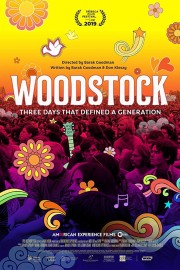Woodstock: Three Days That Defined a Generation
**Listen below to an interview I did with co-director Barak Goodman. I hope you enjoy!**
The three days of the Woodstock festival in August 1969 represent not just one of the most significant and iconic moments in American history, but music history, as well. You don’t have to have been alive, or even attended, Woodstock to know that. Is it well known to the modern generation, though? It should be, since Lollapalooza, Coachella, and any large-scale music festival of the past five decades owes an important debt to what happened in upstate New York at the height of the counter-culture movement, and the war in Vietnam. Hell, watching the two Fyre Festival documentaries about that catastrophe, I couldn’t help but think of Woodstock. This new documentary, looking back on the festival after 50 years, drives it home. Like Fyre, there were things that worked against it that made it an unmitigated disaster (because let’s be honest, Woodstock DID lose money), but it also had people in charge, and people in attendance, who saw the significance of what could be, and turned it into the spiritual success a generation needed at a turbulent time in American history.
The documentary by Barak Goodman and Jamila Ephron is a work of looking back at the time before Woodstock, the people who came up with the idea, the people who executed it, and the people who turned it into what it could be. The 1970 documentary of Woodstock by Michael Wadleigh is justifiably famous, but there’s also no context of the time that inspired Woodstock, or looks back at the way it defined a generation after it. Few films are as “in the moment” as Wadleigh’s film is, and it’s the most exciting part of the film. The film Goodman and Ephron have made, in conjunction with PBS and American Experience, is a compliment to Wadleigh’s film, as we hear from people who put on the concert, people who hosted the concert, people who helped in ways from construction to vendors to medical assistance, and people who were in attendance. Using archival footage, including outtakes not used in Wadleigh’s film, we get a sense of the time, and the way the concert came together, logistically and spiritually.
A film like “Three Days That Defined a Generation” is only effective if it not only sets the context of the events it is looking back on, and offers something new to the audience; this film does just that in its interviews, heard only via recorded voices. (The visual focus is not on talking heads looking back, but on the images of the time, which was a surprising choice when it first started, but became the only choice as the film unfolded.) There are surprises a plenty in the running commentary, and a couple in particular stand out. The first one involves some background on the opening set by Richie Havens that really puts things into perspective in terms of not just how the concert started, but what that start signified. The second one is a logistical choice the promoters had to make at crunch time, when a decision was made in terms of what was more important to build. Either choice would have spelled financial ruin for Woodstock, but only one was the correct one. It’s the one that made sure their efforts in bringing the concert together would not be in vein. The result was an experience that will stand as probably the most important music festival in modern history. Hopefully, as Woodstock turns 50, this documentary will remind people of why that is.










